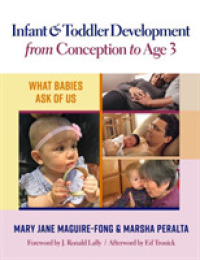Full Description
Great teachers will tell you that you can learn a lot about students from the questions they ask. This book shares 400 of the most important questions kids ask about their brains, along with answers that can be shared with students from ages 3 to 18. What hidden talents do I have? Where does our inner voice come from? How many things can we think of at the same time? Where does the brain keep memories? Why are some people more creative than others? Each of these questions tells teachers a little story about how their students think which can be used to inform classroom practice and improve learning outcomes. The book is grouped into two parts. Part I addresses how your brain makes you who you are (identity, structure, growth, function, emotions and feelings). Part II is about how to optimize its function (memory, attention, and executive functions; learning, excelling and roadblocks). Questions are followed by Big Ideas, which are key understandings of how the brain functions. Integrated throughout the book are more than 60 Implications For Teaching that spell out the usable knowledge from each section. Each chapter ends with a list of resources to reinforce the Big Ideas with students, and the closing chapter suggests specific activities to help students embrace this information for themselves. Whether you are a teacher, counselor, college student, parent, or kid, the information in this book will help you love and admire your own brain and feel empowered to improve it every day.
Book Features:
A window into students' thoughts and concerns about themselves as learners and beings in today's complex world.
A special chapter for classroom teachers with activities and guidance for integrating the information into P-12 lessons.
Big Ideas for readers looking for solutions they can quickly implement in their classroom.
Detailed answers, along with QR codes to the research articles behind them, for readers looking for more in-depth knowledge about learning and the brain.
Insights from a year-long international study in 21 countries that asked kids what they wanted to know about their own brains.
Contents
Preface: Question as a Gateway to the Mind
How to Read this Book
1. The Pedagogy of Listening
Where the Questions Come From
2. Life Changes the Learning Brain
What You Know Influences What You Can Know Educators, Mind, and Brain
3. Identity: Who Am I?
Similarities and Differences
Nature via Nurture Plus Free Will
Perception
Self-Awareness
Summary
Resources to Extend Learning
4. Structure: What Is the Physical Structure of the Brain?
Color and Texture
Weight and Size
Divisions of the Brain
Hemispheres and Laterality
Neurons and Synapses
Blood and Nerves
Summary
Resources to Extend Learning on Brain Structure
5. Growth: How Does the Brain Develop?
Babies' Brains
Children's Brains
Adolescent Brains
Adult Brains
Old Age
Brain Death
Afterlife
Summary
Resources to Extend Learning on Brain Structure
6. Function: How Does the Brain Work and Stay Healthy?
Brain-Body Connection
Control
Sleep and Dreaming
Nutrition
Physical Activity
Summary
Resources to Extend Learning
7. Emotions and Feelings: What Does My Brain Have to Do With My Feelings?
Emotional Processing
Emotional Triggers
Emotional Load
Relationships
Stress
Anxiety
Anger
Fear
Positive Emotions
Happiness
Love
Motivation, Boredom and Procrastination
Summary
Resources to Extend Learning
8. Memory, Attention, and Executive Functions: What Are the Building Blocks of All Learning?
Memory
Creation of New Memories
Storage
Capacity
Retrieval
Forgetting
Attention
Default Mode Network
Preference, Bias, and Distraction
Attention Spans Are Changed By Technology
Déjà Vu
Executive Functions
Activities That Help Executive Functions
Summary
Resources To Extend Learning
9. Learning: How Does Stuff Get Into Our Brains so We Can Use It in the Future?
Processing
Connectivity
Cognitive Load
Maximum Potential
Innate Intelligence
Best Learning
Speed and Range
Genius, Gifted, And Talented
Creativity and Imagiation
Problem Solving
Training and Studying
Summary
Resources to Extend Learning
10. Problems That Impede Learning: Why Are There Brains That Work a Little Bit Differently?
Dyslexia
ADHD
Executive Dysfuntion
Headaches and Brain Damage
Obsessive Compulsive Disorder
Addiction
Psychopaths
Brain Health
Summary
Resources to Extend Learning
11. Final Thoughts
References
Index
About the Author







